Research
Synthesis
Centre for Organometallic Chemistry is mainly focusing on the synthesis of platinum group of organometallic complexes containing various multidendate ligands. These compounds have attracted much attention in organic synthesis, catalysis, materials and biology. In light of this, we have been actively working in the synthesis of Ru, Rh, Pd, Pt and Ni based complexes of carbonyls, tripodals, pincers, NHC, resorcin[4]arene, Schiff bases including TSC, hydrazones. Further, several sub areas in this field were identified to advance environmentally friendly and sustainable processes and the research work is in progress.



Bio-organometallic chemistry
Bioorganometallic chemistry is an emerging area in chemical biology due to varied biological applications of organometallic compounds. Our current research goal is to design and study novel cytotoxic organometallic complexes for targeted therapeutic and diagnostic applications. We are engaged in the synthesis and development of specifically targeted cytotoxic metal complexes such as Cu, Ru, Ni for various therapeutic and diagnostic applications. Their detailed binding interaction studies with biological targets (nucleic acid, proteins etc.) and fate in biological medium were also investigated. Recently we have reported several ruthenium(II) arene complexes with excellent cytotoxicity than cisplatin against many human cancer cell lines and act as potential apoptosis inducers. Our primary objective is to generate active metallo drugs for various cancers without side effects.
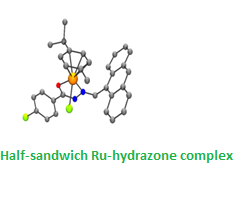
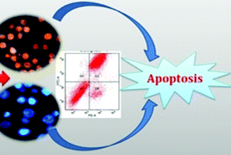
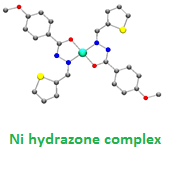
Metal mediated organic synthesis
Transition metals especially platinum group metals open up new opportunities for organic synthesis. In search for unconventional and efficient approach towards metal mediated organic synthesis, our research group is actively involved in the development of flexible, efficient and environmental benign catalytic protocols for the synthesis of organic compounds, intermediates and pharmaceutically important targets. Our research group is engaged in the development of several new Ru catalysts for greener synthesis of amides and imines and Pd catalysts for C-C, (Suzuki-Miyaura, Heck), C-N (Buchwald-Hartwig), C-O, coupling reactions and various other reactions. Organic compounds were synthesized in excellent yield with low loading catalysts with high TON/TOF. Further, our goal is to develop new class of organometallic catalysts, which are expected to find widespread applications in the synthesis of organic materials and bioactive compounds.

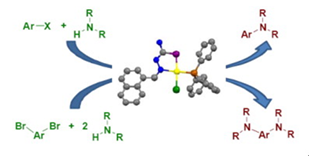
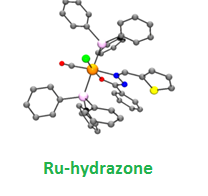
Catalytic organic transformations
Organometallic catalysts are able to efficiently promote different organic transformations. In this class, ketones and imines to alcohols/amines (transfer hydrogenation), alcohols to carbonyl compounds (oxidation), aldehydes to amides and olefin to aldehydes (oxidation) are powerful method for the synthesis of fine chemicals for both laboratory and industrial applications. In particular, ruthenium and rhodium catalyst containing pincer, Schiff base, thioamide, hydrazone and thiosemicarbazone ligands have proven to be effective catalysts for above organic transformations. Recently, we have developed ruthenium(II), ruthenium(III) and rhodium(III) catalysts for many organictransformations. Investigations are going on to improve catalytic activity with high product yield in open atmosphere, without us additives. Notably, these protocol works well with ultra- low loading of catalysts with high turnover numbers in short time towards different substrates
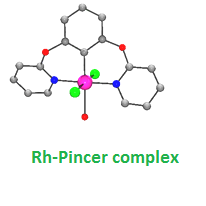
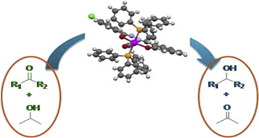
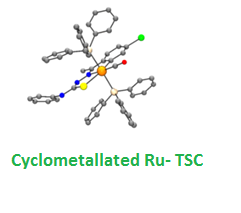
New Materials
The research interests of the COMC includes the preparation of inorganic, organic and polymer materials and to study of their performances in sensors, energy storage and, fluorescence materials and imaging and various biomedical applications. Many organoruthenium(II) complexes have been reported form our laboratory and are promising fluorescence materials at room temperature with high quantum yield. Development of new pincer ruthenium complexes is under progress towards their material science applications such as sensors, molecular switches etc.
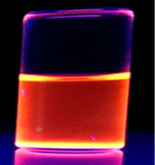
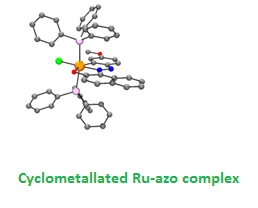

International Research Collaborations
- Phong University of Science and Technology, South Korea.
- University of Strasbourg, France.
- Institute of High Energy Physics, China.
- University of Zurich, Swiss.
- University of Silesia, Poland
National Research Collaborations
- Indian Institute of Chemical Biology (CSIR), Kolkata.
- Indian Institute of Science (IISc), Bangaluru.
- University of Hyderabad, Hyderabad.
- Bharathiar University, Coimbatore.
- Cochin University of Science and Technology (CUSAT), Kochi.
- Indian Institute of Technology (IIT), Guwahati

